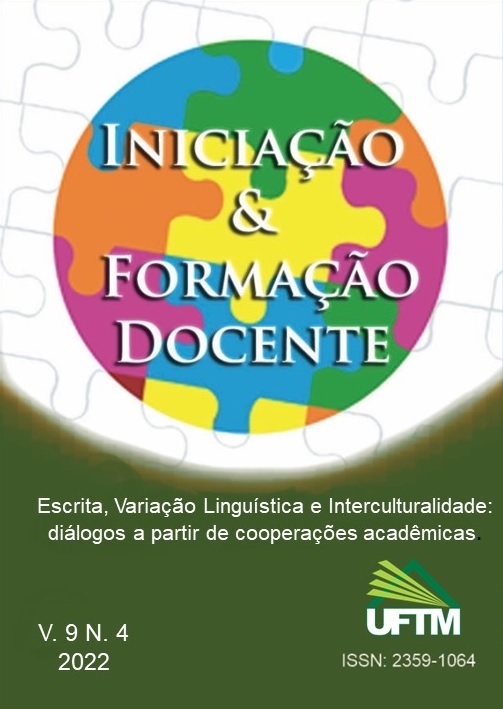Technological resources and teaching strategies
Analysis of portuguese language video classes on Youtube
DOI:
https://doi.org/10.18554/ifd.v9i4.6582Abstract
This paper investigates the use of technological resources as Portuguese language teaching strategies in video classes available on Youtube. The objective is to analyze the resources used in four video classes in the mediation of the contents of this subject produced and presented by SEDUC / PA program Todos em Casa pela Educação, to elementary school students, during the pandemic moment. This study took place in the second semester of 2021, when we selected four Portuguese language video classes aimed at Elementary School and proceeded to the analysis. The research has a qualitative approach, considering the assumptions of Lüdke and André (1986), going through moments of bibliographic study and document analysis (remotely in a virtual environment). The theory is based on discussions about digital technological resources, their social function and teaching, relating to the development of virtual classes. For that, we turn to the following authors: Possenti (1996), Antunes (2007), Geraldi (1996; 2015), Cançado (2008), Abrahão (2018). The discussion about technologies in the classroom was based on the ideas of Soares (2002), Buzato (2006), Moran (1995), Mendes (2020) and Gabriel (2013). The results showed that technology are important in the mediation of Portuguese language L1 content by presenting sensory aspects such as images and sounds, such aspects can contribute to the construction of knowledge, in addition to providing an alternative to teaching.
Downloads
Published
Issue
Section
License
Copyright (c) 2022 INITIATION & TEACHER TRAINING

This work is licensed under a Creative Commons Attribution-NonCommercial 4.0 International License.
Autores do manuscrito deverão preencher e assinar a Declaração de Responsabilidades e Transferência de Direitos Autorais, que deverá ser anexada, pelo autor responsável pela submissão, no passo 4 do processo de submissão no sistema da revista (Clicar na opção “Browse”, selecionar o arquivo que deve ser inserido no formato pdf, clicar no botão “Transferir”, no campo “Título” digitar: Declaração de responsabilidades, depois clicar no botão “Salvar e Continuar” e prosseguir com o processo de submissão).
A Revista Iniciação & Formação Docente da Universidade Federal do Triângulo Mineiro está licenciado com uma Licença Creative Commons - Atribuição-NãoComercial 4.0 Internacional.
Baseado no trabalho disponível em www.uftm.edu.br.
Podem estar disponíveis autorizações adicionais às concedidas no âmbito desta licença em
http://seer.uftm.edu.br/revistaeletronica/index.php/revistagedeles/index


